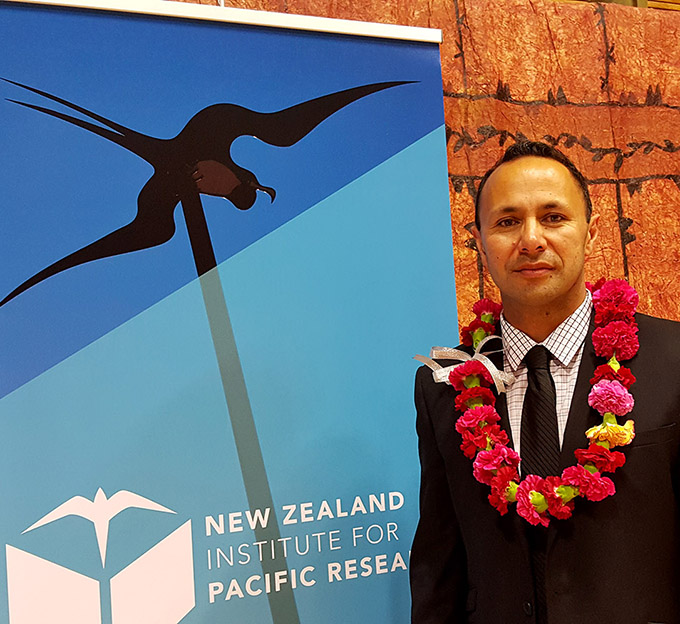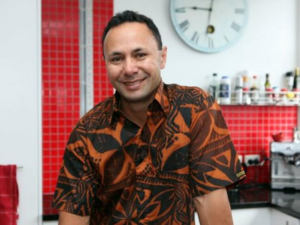
By Sri Krishnamurthi for Asia-Pacific Report
Incoming new vice-chancellor for Te Wānanga Aronui o Tāmaki Makaurau Auckland University of Technology (AUT) Toelesulusulu Dr Damon Ieremia Salesa is keenly aware that he has broken through another glass ceiling.
The son of a factory worker made New Zealand history last week, as the first Pacific person to be appointed to the eminent leadership position in academia at a New Zealand university.
“I’m really excited to be the AUT vice-chancellor and with that excitement comes a sense of its significance with the sector which I work in and have given much of my life to, actually looking like the people it serves. So I’m really excited to be part of that story,” Toelesulusulu told Asia-Pacific Report.
- READ MORE: Pacific scholar Dr Damon Salesa named AUT’s next vice-chancellor
- ‘Transform lives’ with education, new vice-chancellor for AUT tells Pasifika
“AUT is a place where talent can find opportunity and I would hope that lots of other people would want to express that excitement by wanting to come to AUT,” he says.
“What matters more is the work of the whole institution, that the university itself embraces its many different communities, its Māori students, its Pacific students and already AUT is a little bit known for that and what we can do is to build even more deeply on that.”
Professor Steven Ratuva, director of the Macmillan Brown Centre for Pacific Studies at the University of Canterbury, says Dr Salesa’s appointment is a significant milestone for the Pacific.
“It is something he richly deserves, and he has been working hard for and it is a good career choice, it is good for the Pacific academic community, and I congratulate him for his contribution to Pacific education.”
South Auckland priority
Currently pro-vice-chancellor Pacific at the University of Auckland (UOA), Dr Salesa takes up his new role as vice-chancellor at AUT in March.
From just up the hill at UOA, he has observed AUT, and likes what he saw.
“I’ve really admired the way AUT prioritised and served its students, particularly the students of South Auckland and mature students, and that is one of reasons I was really interested in the job,” he says.
“Just because those communities of learners for whom education really matters, AUT has really embraced them and that is part of what is exciting about AUT — that is why I wanted to come across and join AUT.
“There is no question that the campus down south and campus on the shore bring universities into the communities that they serve and as well as being global institutions they are local institutions.
“If you have heart to service and you keep the students at the very centre of the decisions you make, you get great results like you see AUT deliver in South Auckland and the North Shore,” he says.
Strengthening Māori and Pacific research
Pacific and Māori research is one area he wants to strengthen as well as build relationships with other institutions in the Pacific.
“Certainly, one of the things I have as a priority is to make sure that AUT is in all of the partnerships that it needs to be in, that we are serving our communities and our partners as well in a reciprocal relationship from which everyone grows.
“That will mean we have to be a little bit selective, but it will also mean that Pacific partnerships and other partnerships are critical to the very centre of the university, and they are not seen as being marginal because we’re a university in the middle of the South Pacific.
“We need to honour that and be connected to our whanau around the Pacific.

“It is absolutely important that we are having those conversations, we need to understand how we can support the University of the South Pacific (USP) and their work, how we can find benefit and value for New Zealand and AUT students and staff from those relationships, so certainly we will be taking that seriously.
“But certainly, USP is a special institution in our region, so we need to be strategic in how we support and partner with them.”
Associate Professor Shailendra Singh, head of journalism at USP, says “as many have pointed out, the appointment is well deserved. He was not given any preference as a Pacific Islander. He was picked on merit.
A Pacific ‘trailblazer’
“As a trailblazer, he will inspire many Pacific Islanders and Pacific people beyond New Zealand as the vice-chancellor of one of the finest universities in our region.
“Through my association with the Pacific Media Centre (PMC), I have participated in AUT journalism-related workshops, seminars, and conferences.
“I have a high regard for the AUT and the PMC, long a flagship of the university for its cutting-edge research and publications in Pacific journalism.
“I hope the PMC is revived as journalism in the region has been struggling due to economic and political factors. Pacific journalism needs support and leadership and AUT can become the beacon it was,” Associate Professor Singh says.
Dr Salesa was in the dark about the PMC which has now been in hiatus for almost a year for unknown reasons.
“I’d have to learn more about that, I don’t know the ins and outs of that situation, but these are things that have to be collaborative, they have to be built with the kind of collective will and expertise of the university especially.
“There is no question that AUT will be prioritising Māori research and Pacific research among its other amazing specialisations,” Dr Salesa says.
AUT ‘anchored in Pacific’
“AUT will always be anchored in the Pacific region and obviously has a long history of educating people from the Pacific region and we hope to continue and deepen that.
“Those partnerships will speak directly to AUT’s future, and this is a period in time where everyone is just hoping for the best possible outcome for USP, and we will be looking to support in ways that make sense for them and AUT.”
Dr Salesa is testament to the fact that people of a Pacific background or ethnicity can succeed and excel — not just in sport, but in every facet of society.
“I think we’ve always known, as the saying goes, talent is everywhere, but opportunity isn’t — and what AUT is the story of, is making opportunity available to diverse groups of talented people.
“We know if you make opportunities available to those who have been denied them, they will flourish if they are supported in the right way.
“I have no doubt what people will see in my own story is that the kinds of diverse talent we have in New Zealand that too often we haven’t made the most of, can come to AUT and thrive.
“I hope that people see in that all kinds of stories because I am also the son of a factory worker, and I am also a first-generation university attendee people can understand that when talent gets opportunity and support it drives them and that’s what I am hoping you’ll see and that is what success at AUT is all about and its story,” the Auckland suburb of Glen Innes-raised Dr Salesa says.
Education pathway
A strong advocate for education, he wanted young Māori and Pasifika people to pursue that pathway rather than young school leavers joining the workforce.
“We know that education is one of the proven pathways to wellbeing and prosperity for families, and that at the same time we know that many families need their young people to go out and work.
“So, it is absolutely critical that we find ways to get talented young Pacific, Māori and other students into high value employment and education is one of the ways of doing that.
“What we need is for them to be ambitious, to have high expectations of themselves and their families and it is for AUT and other universities to deliver that transformational learning which is the secret to those strong and prosperous futures,” Dr Salesa says.
Transformative learning allowed people to change and have more than one career.
“We know all of us are living in the most uncertain and highly changeable times. In the old days everyone imagined they would have just one career and many people now are realising they might not only change jobs but change careers and they have also come to realise that in many, many of our jobs technology sits at the centre of opportunity and the ability to be effective.
“AUT is the kind of institution that is built for these times, it offers all sorts of flexible learning offerings and a truly diverse student body and it is New Zealand’s tech university.
Transformative learning
“So transformative learning is the kind of learning that actually transforms individual students lives where you can see outcomes writ large and that’s what I’m hoping to support further development at AUT so that people understand AUT is a great place to go, to study and get a great job but also prepare themselves for a great future,” Dr Salesa says.
Then there was the inevitable vexed question, whether it was time for another university, namely AUT, to start a new medical school? To which he played with a straight bat.
“At the moment AUT is one of the great providers of the health workforce in New Zealand and certainly for the short term we will be focusing on doing an even better job of doing that.
“Delivering a health workforce and the health researchers that New Zealand needs. That is obviously a critical contribution in the age of the pandemic, but again that will be built collaboratively with my colleagues at AUT.
“I think it is a very challenging time for universities across the board and particularly where next year is going to be where students have had two years of lockdown learning in Auckland so we have to make sure that the university can support them in their ambitions to be successful at AUT.
“That is going to be one of the great challenges, not just facing AUT, but all the tertiary providers that have suffered lockdowns in Auckland.”













































